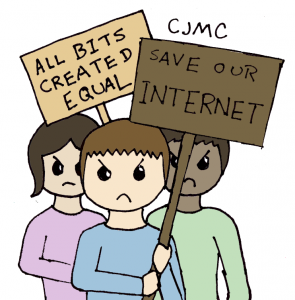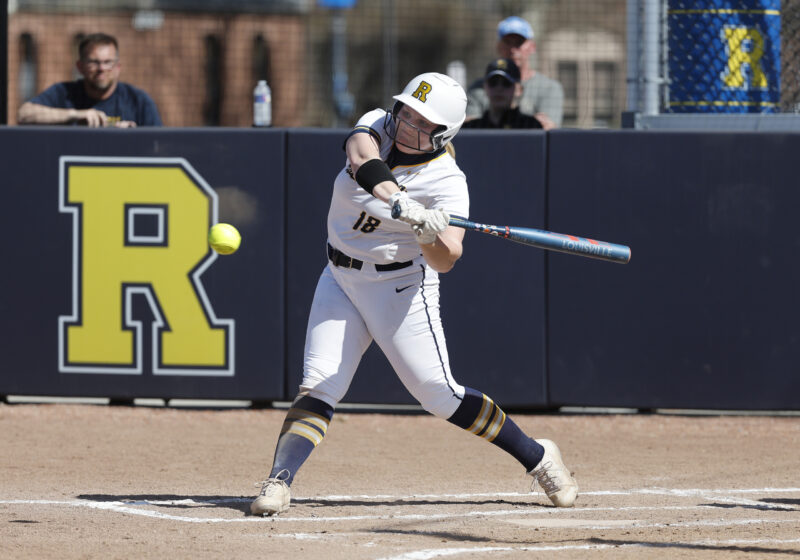Grumpy Cat is making the rounds at Comcast’s headquarters this week. Adorned on a banner carried by a plane circling the giant ISP’s headquarters, the unhappy feline is accompanied by words celebrating the FCC’s recent ruling on net neutrality and hinting at the continuing struggle to come:
“COMCAST: DON’T MESS WITH THE INTERNET.
#SORRYNOTSORRY #NETNEUTRALITY.”
It’s the latest in a series of jubilant messages following the FCC’s ruling this past Thursday, which ruled that the Internet will be classified as a utility similar to telephone and radio services and subject to the same governmental regulations. It’s a move that reinstates similar policies, in a hopefully more permanent fashion to the old net neutrality rules, which were struck down by federal courts in 2010. FCC Chairman Tom Wheeler has recommended that Title II of the Commnications Act of 1934 be applied to broadband service, “modernizing” it, he writes, and “tailoring it for the 21st century.”
Before the ruling there, was a significant push from Internet activists, content providers and general consumers to make the move back to neutrality. The argument has largely been focused around the idea of internet “slow lanes”—without the rules of the FCC, Internet service providers such as Comcast, Verizon and AT&T are free to throttle bandwidth on certain types of data unless content providers pay a fee for faster service.
This change was most publicly seen in the battle between ISPs and popular streaming service Netflix, as the bandwidth- intensive service was attacked again and again with rising costs after the old net neutrality rules lost legal support. Threatened with massive spikes in loading times and hopelessly poor video quality, Netflix eventually relented, paying an undisclosed amount of money to ISPs to retain their speed and consumer value.
Consumers have argued that this form of throttling is hopelessly unfair to both users and content providers. Under a “fast-lane” system, the benefits are sharply in favor of large companies that can afford the fees for fast service, leaving smaller startups and individuals who perform their own hosting to deal with slow service to almost all of their users. Arguing that the only way for the Internet to remain the incredible source of information and utility it is today is through fairness, these activists have demanded that the old rules be reinstated and neutrality be restored. For these parties, Thursday’s ruling is a tremendous victory.
Obviously, ISPs are less excited. Their argument is that services like Netflix are damaging to the Internet ecosystem, demanding disproportionate amounts of bandwidth and service for free. And while some “reasonable network management” is still permitted, the ruling will also prevent consumer level throttling, such as that seen in many “unlimited” plans where speeds are sharply capped once a certain data level has been exceeded. These giants are undoubtably gearing up their lawyers for a long haul of appeals and lawsuits that will be sure to last many years into the future.
And even some outside the ISP business have raised objections. Speaking at the Mobile World Congress, Nokia CEO Rajeev Suri feels that the ruling could prevent new information-intensive technologies from getting the support they need to function properly. Chief among his concerns were self driving cars, in which Nokia has significant investments. “There are some services that simply require a different level of connectivity” he said, “You cannot prevent collisions if the data that can prevent them is still making its way through the network.” Other concerns he voiced included service to hospitals, where doctors could have difficulty receiving the massive amounts of data many modern medical devices require.
But such concerns may be lost in the public’s demands that the internet should now and forever remain free for all. No matter how much they spend on legal attacks, ISPs cannot simply lawyer away the millions of online users who benefit from the ruling and support internet as a utility. And unless they can create an appealing spin to combat the tremendous consumer pressure that supports net neutrality, they’llajust have to just deal with Grumpy Cat for a little longer.
Copeland is a member of the class of 2015.





